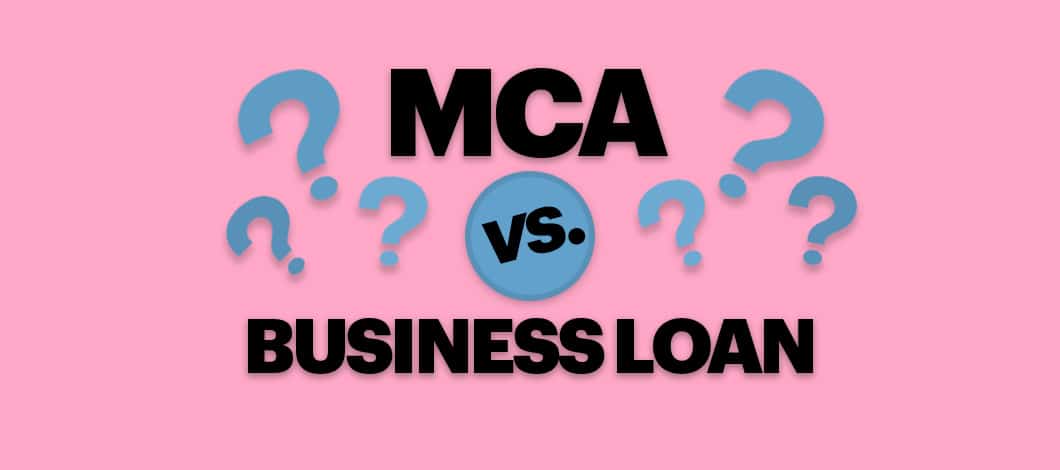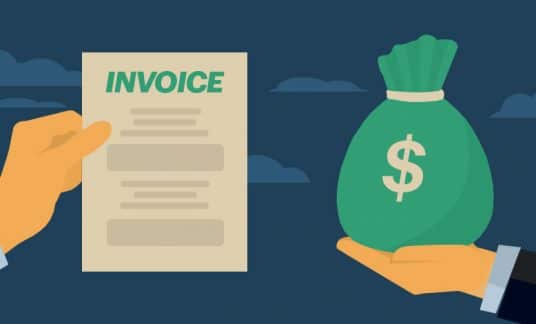For small business owners, securing financing is vital to success. The 2019 Small Business Credit Survey found 56% of small businesses apply for loans specifically to expand, pursue new opportunities or acquire business assets. While there are various funding options available, for some it may come down to a merchant cash advance vs. a business loan.
Although the first thought may be to take out a business loan to cover your financial needs, it may not be your best option for the current situation. In some cases, your best bet might be to take out a merchant cash advance.
What Is a Merchant Cash Advance?
A merchant cash advance (MCA) is a financing option in which the provider lends a lump sum to a business, which the business then repays using future revenues over time.
MCA terms are shorter in length, with about 24 months being the maximum. Often, companies will enter terms of three to six months with MCA lenders.
MCAs are repaid daily or weekly, with the company paying a percentage of the revenues generated in that time period. So, you’ll end up paying more toward an advance if you do more business, but will be able to scale back payments when there’s a lull in sales.
Companies that use MCAs are usually in need of immediate cash to help deal with an emergency or otherwise stave off financial disaster.
What Is a Business Loan?
A business loan also provides a lump sum of money to a business, with the company then repaying the loan (plus interest) in equal installments over a set period of time.
Business loan terms can be as short as 3-24 months, or can stretch out over 25 years. The length of the term — along with other individual factors — will determine the interest rate a company will receive.
Loans are typically used to invest into business growth, and often require companies to document their intentions as part of the approval process.

Merchant Cash Advance vs. Business Loan: Factors to Consider
When searching for funding of any kind, there are a number of factors to consider when weighing merchant cash advances vs. business loans, including:
- Loan amounts
- Timing
- Interest Rates
- Requirements
- Application Processes
Let’s break these down further:
Financed Amounts
The amount of cash you can receive from an MCA or term loan varies greatly.
Many merchant cash advance services will lend hundreds of thousands of dollars at a time. Credibly, for example, offers up to $400,000 — with others lending a maximum of $600,000 to businesses in need.
For MCAs, the amount given is relative to the company’s revenues. Typically, providers will offer anywhere from 100-250% of a client’s monthly revenues.
Business loans, of course, can be much higher — and can often reach into the millions. However, the average small business loan given by Fast Capital 360 lenders is $31,000, with $107,000 being the average for SBA loans.
Business term loans are generally determined by the business’ stated needs and current financial situation. In contrast to MCAs, term loan lenders look at what the business will be doing with the funding requested to determine eligibility.
Timing (Funding and Repayment Terms)
When taking out an MCA or business loan, it’s important to factor time into the decision.
First, consider the amount of time it will take for you to actually receive funding.
Some business loans, such as SBA loans, can take months to process. SBA Express loans have a 36-hour turnaround time — but businesses must meet stricter qualifications to be approved.
Many online business loan providers can deliver funding within 24 hours of receiving an application. A provider’s existing clientele will likely receive funding in this shortened period of time.
That said, a 24-hour turnaround is essentially table stakes for all merchant cash advance providers. For companies that truly need cash immediately, MCAs offer a distinct advantage in this area.
Another factor to consider is term length.
For business loans, companies will likely need to enter terms for at least one year — and possibly more. SBA Loans, for example, can last anywhere from five to twenty-five years.
MCAs offer shorter term agreements, sometimes as short as three months in length. On the other end of the spectrum, some MCA lenders will offer repayment plans up to 24 months.
Both business loans and MCAs are paid back at agreed-upon intervals. While bank loans are typically paid on a monthly, and sometimes weekly basis, MCAs are often paid back weekly or even daily.
Interest Rates
Interest on loans and advances vary widely on a case-by-case basis.
The average interest rate for a business loan hovers around 7%. Companies in better financial standing and with a more comprehensive financial history can sometimes get interest rates as low as 5%. Companies that aren’t in the best financial situation might have to work with sharply higher interest rates.
Merchant cash advance providers don’t technically charge interest, but rather a factor rate. Expressed in decimal form, factor rates usually hover around 1.1 to 1.5 — which translates to 10%-40% of the advanced amount.
Advance Amount X Factor Rate = Total Payback Amount
| MCA Amount | Factor Rate | Total Payback |
| $10,000.00 | 1.25 | $12,500.00 |
| $50,000.00 | 1.15 | $57,500.00 |
| 100,000.00 | 1.10 | $110,000.00 |
Requirements and Application Process
It’s important to know that you qualify for funding as you look for the solution that’s right for you.
Business loan lenders often require their clients meet a certain standard to determine their eligibility. Some factors they consider include:
- Time in business
- Credit score (personal and business)
- Monthly revenue
For example, bank loans may require companies to have been operational for at least 2 years with consistently high revenues. Banks also require that owners have a certain credit score, sometimes 700 or higher. SBA loans are only given to owners of established companies with credit scores of 650, and that make at least $50,000 in yearly revenues.
To secure business loans, owners will sometimes have to produce collateral, along with a business plan as to how they’ll be using the funds requested.
Remember, the process of securing a business loan varies widely. While loan applications through banks or the government can take weeks or months to be processed, online loans can potentially be secured in a matter of days — if not hours.
In either case, borrowers will need to produce a fair amount of information to have their loan application processed, including:
- A piece of government identification
- Business license and permits
- Articles of incorporation (if applicable)
- Owner’s tax return, including the Schedule C form
- The “doing business as” with owner’s name attached
- Stock ownership documents (if applicable)
- Internal Revenue Service (IRS) form K-1
- Company stock certificates
So, companies looking to secure a business loan will not only need to meet certain requirements, but must have “all their ducks in a row” when it comes to business documentation.
MCAs, on the other hand, are known for their low barrier to entry. While a company’s current and past financial circumstances may influence the factor rate received, most businesses will qualify for a merchant cash advance relative to their monthly revenue.
MCA lenders also don’t require the additional documentation mentioned above. As long as a business shows the ability to pay back the advance in due time (via current sales records), they’re all but guaranteed to secure the funding.

Merchant Cash Advance vs. Business Loan: Which One?
MCAs and business loans are both viable options for companies in need of funding.
If you’re looking for an answer as to which is better, the answer is: “It depends.”
Your company could take advantage of an MCA at one point, then get even more value out of a business loan at some point down the road.
Instead of thinking about which is “better,” let’s consider when acquiring a merchant cash advance or a business loan will be your better option.
MCAs: Good for Small Businesses in a Pinch
For businesses that find themselves in a difficult financial situation, an MCA might be the best way to secure immediate funding.
We mean companies that:
- Don’t have great credit
- Are low on cash — and have an immediate financial need
- Don’t have much of an established financial history
For one thing, the MCA application and funding process is all but guaranteed to be quicker than the more formal alternative. Getting funding in a matter of hours or days is crucial when facing an emergency or other dire financial need.
What’s more, MCA lenders aren’t as strict when it comes to borrowing requirements. This means less time spent getting documentation together, and a higher chance of being approved for an advance.
It’s also worth remembering that MCA payments scale to your daily or weekly revenues. This helps businesses with uncertain revenue patterns avoid having to make large loan payments when sales are down.
| Merchant Sales | 15% Daily Holdback |
| $1,000.00 | $150.00 |
| $750.00 | $112.50 |
| $500.00 | $75.00 |
However, there are some downsides to merchant cash advances.
First and foremost, they’re expensive — perhaps the least cost-effective funding option there is. You’ll be paying anywhere from $100 to $400 for every $1,000 borrowed, which can sharply impact your revenue for the foreseeable future.
On that same token, the daily or weekly repayment structure for MCAs makes it difficult to invest your advance on growth. Though you’ll have gotten your lump-sum payment upfront, you’ll likely only be able to use it to tread water — and will still need to secure additional funding to spur growth in the future.
That being said, an MCA might not be the best choice for established, financially stable businesses looking to ramp up operations.
But if you need cash immediately with pretty much no questions asked, an MCA may be your best option.
Business Loans: An Investment Into Growth
Term loans are the better option for companies that have shown consistent success and growth over time — and that need some extra cash to bring their business to the “next level.”
The more financially stable your business is, the more likely you are to receive the term loan that’s best for your company. As we said earlier, lenders will look at a number of factors to determine how much you’re eligible to receive, and at what interest rate — or if you’re eligible for a loan in the first place.
Lenders also consider how you’ll be using the funds you receive to grow your business. So, you’ll need to have a pretty clear plan in place for your company’s future — which you can only develop if you’re in a good spot financially.
Even if your company is able to be approved for a loan on paper, you also want to consider the impact it’ll have on your future. Will you be able to repay the loan on time, every time? Or will it become a problem when the business hits a lull?
Again, business loans aren’t meant to save your company from dire straits. Rather, they’re to spur growth by providing funding to be used for hiring new employees, purchasing additional equipment, expanding to new territory, and other such improvements.










